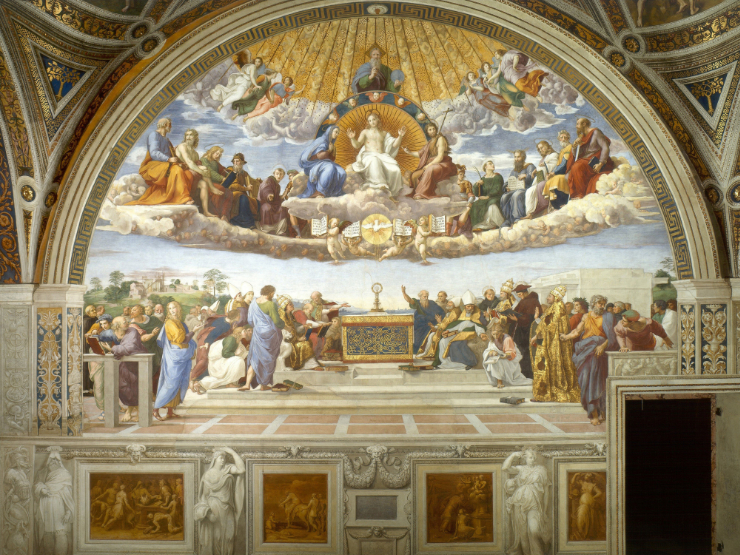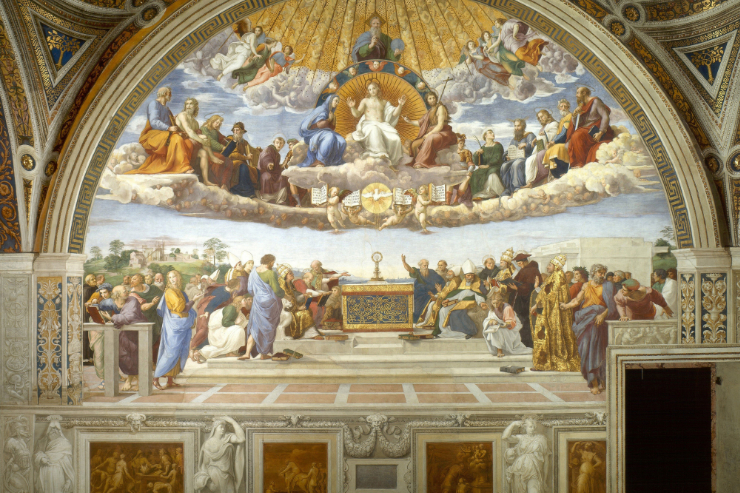
Disputa (Disputation of the Blessed Sacrament) by Raphael
The great philosopher Aristotle said “The least initial deviation from the truth is multiplied later a thousand fold.” These modern times bear out this wisdom. When influential thinkers of the past such as William of Occam, Francis Bacon, Rene Descartes, John Stuart Mill, Immanuel Kant, G.W. F. Hegel and several others took deviations from the truth in their philosophies, it laid the groundwork for far greater deviations to be committed by the likes of Marx, Freud, Darwin, Nietzsche, Dewey and other public figures who worked diligently to multiply the thousand fold errors that shroud our age in the darkness of untruth. These very few men have had an enormous and devastating impact on the public square, the public imagination, the public discourse, politics and our schools. Their errors have multiplied in thousands upon thousands of students who now unquestioningly take these errors as a priori assumptions.
Faithful Catholics find themselves in an age hostile to wisdom and revelation where nearly all public entities rail against and in contradiction to the revealed truth of the Logos, our Savior Jesus Christ. The errors taught by our universities, high schools and elementary schools, propagated by politicians even up to the Supreme Court, broadcast by an immoral mass media, used by misguided psychologists, and now written into our conventional laws are too numerous to count. Interestingly, many of the thousand fold errors have their roots in attacks on three grounding propositions undergirding Catholic truth: the existence of God, the immortality of the human soul, and the existence and nature of free will. Such is the force with which our society attacks these three root issues that even Catholics are daunted by these propositions. However, as we shall soon see, these three issues comprise the difference between heaven and hell.
The Existence of God
Does God exist? This is the most fundamental of all theological questions and must be answered to proceed to the countless interesting questions about the Creator and His relationship to man, earth, and the cosmos. To come to the conclusion that there is no God radically changes the nature of man’s perennial questions. Believers and atheists ask and try to answer the same questions, but their answers are not similar in any qualitative sense, even if they use the same words. One example is that both the atheist and the believer might assert that man is made for virtue and that much effort ought to be spent cultivating virtue. The infinite difference is that a believer will cultivate virtue to glorify and serve God while the atheist can only cultivate virtue to glorify and serve himself.
Nearly all modern fields operate under the assumption that God does not exist. Modern society venerates the hard sciences to an inappropriate degree and instead of turning to the great thinkers of the past, we are likely to look for wisdom from our scientists. Little could be more foolish than this. It is like asking a desert monk how to build a nuclear powered rocket when we ask rocket scientists to tell us about God.
Science darling Stephen Hawking makes his pronouncement on the existence of God in the following, short video. In less than two minutes, the science guru does away with the God, immortality of the soul, the economy of Salvation, the history of the Faith, the history of philosophy and the great ideas of countless great men and women who preceded him.
[youtube id=”1zblTCsThDE”]
Hawking’s basic flaw is scientism, the disordered belief that the highest form of knowing comes from the scientific method. He is indefinably more influenced by evolutionary theory than by Aristotle and the army of intellectual giants who forged the perennial philosophy. He concludes, with an army of anti-intellectual sophists, that all life is accidental. He has eliminated the need for the first cause by the misuse of speech. He claims since there was no time before the big bang, there was no time for God, therefore God could not have created the universe and therefore God does not exist. Catholics have known from the beginning that God is a spiritual being outside of time and space but Hawking simply reduces God to a material entity or at least tries to hold Him to the material dialectic in such a way that just might sound plausible to modern ears. Ears disciplined to seek wisdom by the right use of the intellect might easily detect the fallacy.
Those who disbelieve in God find themselves at infinite odds with faithful Catholics. The full extent of the divide can only be hinted at by contemplation of such things as justice. To one who believes in the Creator, justice is a matter of giving first to God what is owed to Him by those He created and second by giving to God’s other creatures what is due to them as images and likenesses of Him. The highest justice for believers is self-sacrifice for the good of the other which emboldens the hope of eternal salvation. In contradistinction, justice for one who denies the Creator can only be the consideration of what is due to the self by others. There can be no real duty to God and neighbor other than that which self-serves. It is clear to see in our society of increasing disbelief that this notion of justice disintegrates societies and endangers countless immortal souls.
The Immortality of the Soul
The fact that all humans have immortal souls is not readily apparent nor demonstrable to those exclusively immersed in scientific thinking. This Dark Age is steeped in skepticism and mistrust of the intellect. This is a rare time in human history for its lack of belief in the afterlife. In all cultures and civilizations in human history, the immortality of the soul was perceived by intuition and common sense and attested to in nearly all wisdom literature from the Book of the Dead to the Bible. We may live in the first great civilization to deny the immortality of the human soul and the difference it makes in our society is enormously disintegrating.
The immortality of the soul is discoverable by natural philosophy. Using the kind of thinking foreign to our age, Thomas Aquinas explains in his Summa part 1, question 75, article 3, that “The operation of anything follows the mode of its being.” We have the ability to abstract ideas of immaterial realities. By the use of our wills, we strive for permanent things and we have a natural desire to live forever. By natural reason we can discover that if all human desires have a means by which that natural desire is satisfied, then there must be an end to our desire to live forever. That end necessitates the immortality of the soul. So even though eternity is a great mystery for mankind, we must be fitted out in some way to embrace it.
Another intellectual point of evidence for the immortality of the soul is the objective moral law. Plato, in his dialogue the Phaedo, touches on the immortality of the soul in relationship to the natural law and the virtue of justice. If there is a law outside of ourselves, which surely there is, and we break this law, which surely we do, there must be some kind of just consequence to be meted out in the order of reality to conform to the unchanging nature of reality, especially concerning divine justice.
We might wonder how the immortality of the soul is denied in this age and the answer is simple. We live in times when most people reduce the entirety of reality to its material aspects while ignoring the immateriality of intellect and will. So pervasive is the primacy of empirical science that everything that lies outside of material and sense observation is suspect. Since the soul is an immaterial reality, it is easily dismissed by the modern academic. This flows into society by way of universal education and the structures of media tirelessly working to broadcast this and many other false ideas. The fact that the soul is the substantive formal cause of the human person and that therefore every human soul is immortal is increasingly denied and the consequences on culture and civilization are devastating.
We who believe in the immortality of the soul have the opportunity to understand our creaturely status, to give to God what is God’s and to neighbor what is owed to him by Christ’s twin commandments. Those who deny the soul have no such opportunity to serve God and neighbor. It gets much worse because if one thinks the soul ends with natural death, this idea alone drives him to efforts to fulfill material and temporal appetites and to ignore his eternal desires. Modern man’s answer to the desire for eternal life while denying the immortality of the soul is understandably to make an idol out of medical science so that he may live longer and possibly forever, not by the grace of God, but by the contrivance of medical technology.
Perhaps even more troubling is that those who deny the immortality of the soul also deny the need to cultivate virtue for the sake of objective justice. Virtue for the non-believer becomes a venture of self-servitude and ultimately camouflaged vice. Virtue misused is hollowed out of it intrinsic moral worth because any end other than to serve the objective order of reality for the sake of God and neighbor is contradictory to the nature of true justice.
Freedom of the Will
The true nature of love necessitates the freedom of the will. Love cannot be forced or coerced and God will not oblige us. However, even though it is a self-evident fact that we have free will and we are at liberty to choose our moral acts, this reductionist age insists on denying the obvious. Modern man believes that by genetic makeup and environment we are compelled to act as we do and there is no choice involved. Surely genes and environment play a role in our dispositions, our attractions and even influence some of the choices we make, but that is not the whole story.
The reason modern man denies freedom of the will is similar to the reasons he denies the immortality of the soul, by material reduction. The precise word is determinism and this is the idea that we are determined by our genes or environment to act in a particular way. Sometimes the conversation includes conditioning, and ideas associated with animal behaviorism. The material reductionists, in denying metaphysical and philosophical truth, necessarily reduce humans to a type of animal to be trained instead of a free moral agent with whom to reason.
If we are so foolish as to deny that all humans have free will, it logically follows that we are not responsible for the good or bad things we choose to do. This silly notion eliminates both praise and blame. Criminals are no longer responsible for their criminal behavior, they were just born that way or had a difficult home. Also, those who act with heroic virtue cannot be venerated if their heroic actions were never a choice at all. To deny free will is absurd.
Avoid Error
An authentic conversation between faithful Catholics and the modern world is increasingly difficult primarily because of these three root issues. If we do confront the world we must begin with the truths that God exists, that we have immortal souls and that we have free will. It is very likely that a conversation between us and non-believers will appear to be taking place when in fact what we Catholics mean by God, immortality and freedom will have different and even converse meanings to the soul who denies these three truths. Even faithful Catholics are challenged in this age to clarify a stance on these three issues because the default position today is disbelief.
The modern world is so steeped in material reductionism that these three errors have multiplied a thousand fold. Though it may be difficult to see, most of the modern errors find their roots in these three issues. As Catholics we must begin with the root truths that God the Father Almighty exists, that He made us in His image and likeness with an immortal soul and He gave us the unbearable gift of a free will that we may choose to love Him truly or reject him. In order to avoid error we must operate from these foundational truths to discover the nature of reality and our place in it by the most profound fact in the history of the universe, the advent of Christ. If these are the principle truths from which we begin, we will avoid the thousand fold errors of the modern world. If we don’t get these three issues right, we won’t be able to get anything right. These three issues are worth getting right, our eternal disposition depends upon it.














